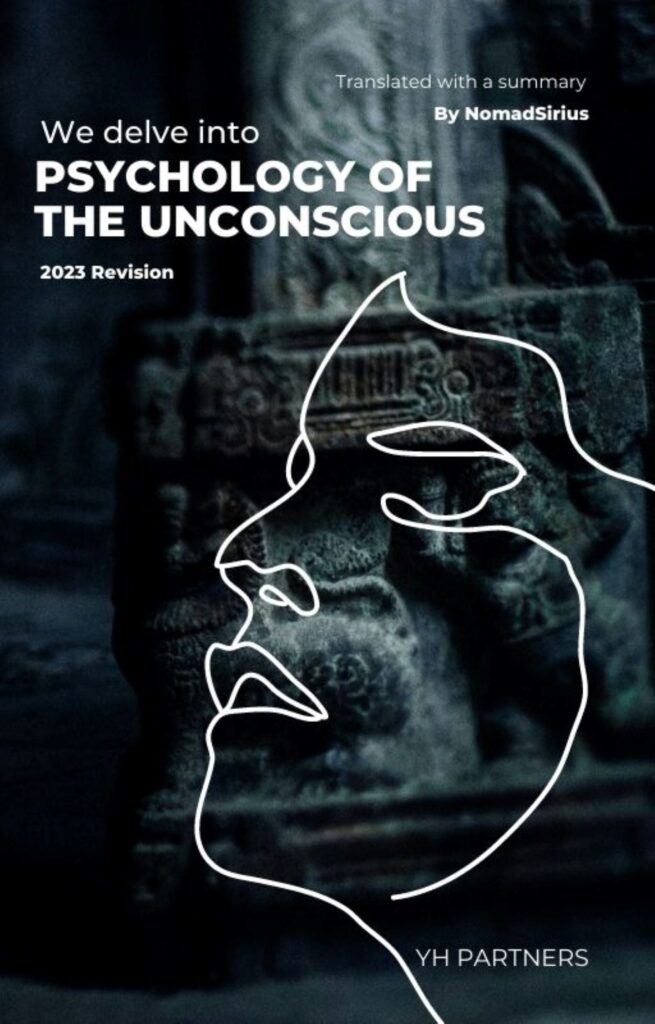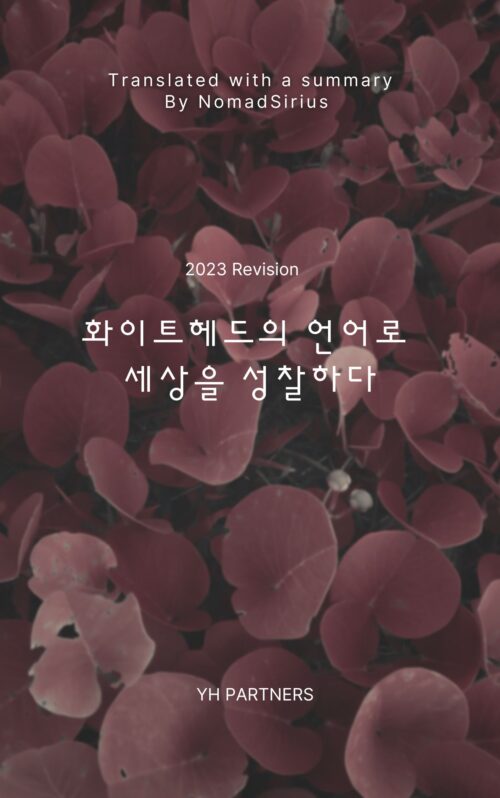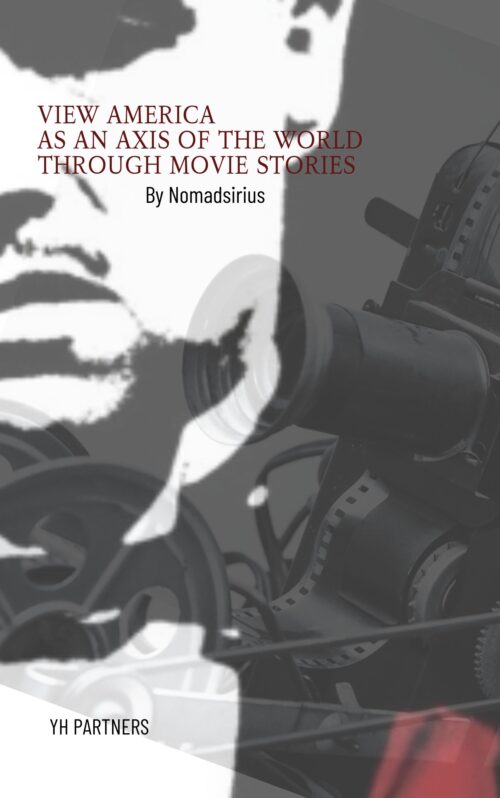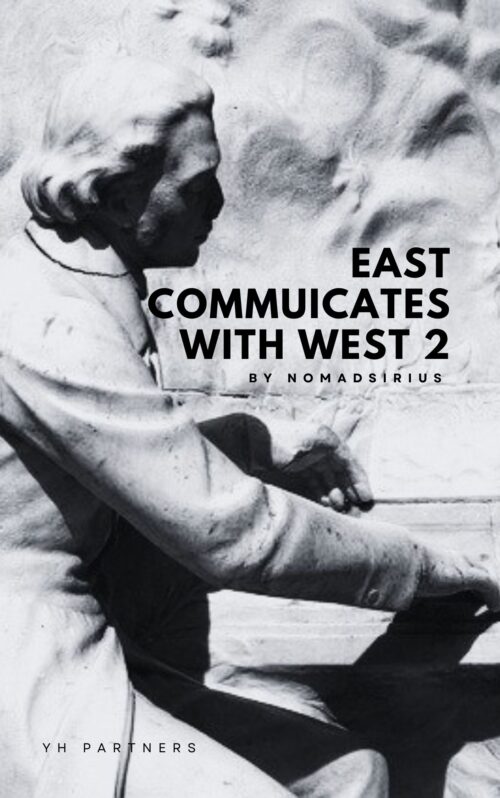We delve into Psychology of the Unconscious(In English, 2023 Revision).
Original price was: $8.$6Current price is: $6.
25% Off
We delve into Psychology of the Unconscious(In English, 2023 Revision).
Prologue.
Carl Gustav Jung was a Swiss psychiatrist. In 1902, he obtained his medical doctorate from the University of Zurich. He conducted extensive research under the supervision of psychologist Eugen Bleuler, who was a professor at the university. While collaborating with Freud, he began to study psychology in-depth. In 1908, at the age of 34, he co-founded the International Psychoanalytic Society with Freud. In 1912, after publishing ‘Transformation and Symbolism of the Libido’, he ended his professional relationship with Freud due to differences in their views on the unconscious mind. At the age of 44 in 1918, he further developed his theory of in-depth psychology, introducing the concept of the ‘collective unconscious.’ To study archetypes in the collective unconscious, he conducted comparative research in cultural and religious history. In 1930, he presented a paper that discussed the theoretical considerations of prototypes. In 1935, he organized and led the Eranos Conference, a gathering of scholars from around the world. Focusing on the influence of the collective unconscious’s prototypes on personality and self-awareness, he immersed himself in the study of alchemy. In 1948, the Jung Institute was established in Zurich, Switzerland. In 1953, the complete English edition of his works was published. ‘Psychology of the Unconscious’ was written in 1912 when Jung was 38 years old. Jung explores the unconscious world by analyzing Miss Miller’s fantasy system. Through a transcendent desire that surpasses time and space, he seeks to understand the nature of human conflicts. By uncovering the common threads connecting ancient times, he expands the understanding of the unconscious and develops intellectual insight. This book provides a concise summary of a lengthy and challenging text.
Description
We delve into Psychology of the Unconscious(In English, 2023 Revision).

We delve into Psychology of the Unconscious(In English, 2023 Revision).
Prologue.
Carl Gustav Jung was a Swiss psychiatrist. In 1902, he obtained his medical doctorate from the University of Zurich. He conducted extensive research under the supervision of psychologist Eugen Bleuler, who was a professor at the university. While collaborating with Freud, he began to study psychology in-depth. In 1908, at the age of 34, he co-founded the International Psychoanalytic Society with Freud. In 1912, after publishing ‘Transformation and Symbolism of the Libido’, he ended his professional relationship with Freud due to differences in their views on the unconscious mind. At the age of 44 in 1918, he further developed his theory of in-depth psychology, introducing the concept of the ‘collective unconscious.’ To study archetypes in the collective unconscious, he conducted comparative research in cultural and religious history. In 1930, he presented a paper that discussed the theoretical considerations of prototypes. In 1935, he organized and led the Eranos Conference, a gathering of scholars from around the world. Focusing on the influence of the collective unconscious’s prototypes on personality and self-awareness, he immersed himself in the study of alchemy. In 1948, the Jung Institute was established in Zurich, Switzerland. In 1953, the complete English edition of his works was published. ‘Psychology of the Unconscious’ was written in 1912 when Jung was 38 years old. Jung explores the unconscious world by analyzing Miss Miller’s fantasy system. Through a transcendent desire that surpasses time and space, he seeks to understand the nature of human conflicts. By uncovering the common threads connecting ancient times, he expands the understanding of the unconscious and develops intellectual insight. This book provides a concise summary of a lengthy and challenging text.
Author ‘NomadSirius’ Introduction.
‘Sirius’ is the brightest star in the night sky. Its name is derived from the Greek word “Seirios,” meaning ‘glowing’ or ‘scorching.’ Imagining Sirius rising just before sunrise, I embark on the classic and humanities-inspired ‘Nomad’ journey. With the aim of introducing the essence of Oriental culture to the West, I am planning to publish a series of 333 eBooks, an English Oriental Humanities Glossary, and an aesthetically pleasing English Fantasy novel.
A series of 333 eBooks.
- 노자의 언어로 세상을 성찰하다(In Korean, 2022).
- We permeate into The Tao Te Ching(In English, 2022).
- 화이트헤드의 언어로 세상을 성찰하다(In Korean, 2022).
- We permeate into The Function of Reason(In English, 2022).
- 장자의 언어로 세상을 성찰하다(In Korean, 2022).
- We permeate into The Zhuangzi(In English, 2022).
- 칼 구스타프 융의 언어로 세상을 성찰하다(In Korean, 2022).
- We permeate into Psychology of the Unconscious(In English, 2022).
- 붓다의 언어로 세상을 성찰하다(In Korean, 2022).
- We permeate into The Diamond Sutra(In English, 2022).
- 니체의 언어로 세상을 성찰하다(In Korean, 2022).
- We permeate into On The Genealogy of Morality(In English, 2022).
- 예수의 언어로 세상을 성찰하다(In Korean, 2023).
- We delve into Romans(In English, 2023).
- 인문잡학으로 소통하다 1(In Korean, 2023).
- East communicates with West 1(In English, 2023).
- 화이트헤드의 언어로 세상을 성찰하다(In Korean, 2023 개정판).
- We delve into The Function of Reason(In English, 2023 Revision).
- 노자의 언어로 세상을 성찰하다(In Korean, 2023 개정판).
- We delve into The Tao Te Ching(In English, 2023 Revision).
- 칼 구스타프 융의 언어로 세상을 성찰하다.(In Korean, 2023 개정판).
- We delve into Psychology of the Unconscious(In English, 2023 Revision).
Publication Right.
We delve into Psychology of the Unconscious(In English, 2023 Revision).
ⓒ YH Partners 2022
The Date of Publication. 2023.7.11.
Author. nomadsirius.
Publisher. YH Partners.
The Registration Number of Publisher. 2022000013.
Price of eBook. $6.
Address. 20 Landmark-ro, Songdo-dong, Yeonsu-gu, Incheon, Republic of Korea.
E-mail. liberalistkr@gmail.com
ISBN. 979-11-92838-11-3.
This book is copyrighted by the author and YH partners.
Table of Contents
- Two kinds of thinking.
- A food that nervous women have a special predilection for.
- What do the behemoth and leviathan in the Book of Job look like?
- Faust’s contradictory impulses.
- What is an exhaustible and mortal light?
- What is the motive behind all arts, including poetry, music, and painting?
- How to unleash creative libido.
- Where are the heroes headed?
- What is born of water and the Holy Spirit?
- The deadly arrows.
- The dual mother.
- Michelangelo’s Pieta.
- Two kinds of thinking.
(1) What I have read is like this.
We have two forms of thinking: directed thinking and dream or fantastic thinking.
The first form, directed thinking, is used for communication through speech elements.
It combines natural sounds into meaningful structures and generates intellectual processes.
The result of the cooperation between sound and sign exchanges is the production of abstract thoughts.
Scholasticism elevates the symbol of speech, the word, to an absolute meaning.
It provides the mind with dialectic training in directed thinking.
Scholasticism can be considered the mother of the scientific attitude.
Science and the technology fostered by it are the most beautiful expressions of directed thinking.
Language serves as a repository of tradition and contains all the intellectual achievements of individuals.
Fantastic thinking operates spontaneously with memories and is characteristic of antiquity.
When directed thinking ceases, we replace it with fantasies and engage in fantastic thinking.
Both waking dreams and dreams fall within the realms of conscious and unconscious experiences.
Above dreams, there exists a wholly unconscious system of fantasies in split-off complexes.
During sleep or dreams, we traverse the entire thought of early humanity.
The products originating from the unconscious are mythical in nature.
Mythical traditions reveal thoughts common to humanity and continuously rejuvenate them.
Myths correspond to a collective dream of entire nations.
A myth is a fragment of the infantile soul-life of a people, whereas a dream is an individual’s myth.
Every Greek of the classical era carries within themselves a fragment of the Oedipus myth.
Similarly, every German carries a fragment of Faust within themselves.
(2) Ease into ‘Two kinds of thinking’ with Nietzsche’s thoughts.
In dreams, relics of humanity are passed down from generation to generation, remaining intact.
These dreams serve as the foundation for higher rational functions.
They transport us back to earlier stages of human culture.
Dreaming acts as a restorative process for the brain, which becomes fatigued from skilled thinking during the day.
The notion of considering causes and effects seriously is a recent development in human history.
Only logged in customers who have purchased this product may leave a review.





Reviews
There are no reviews yet.